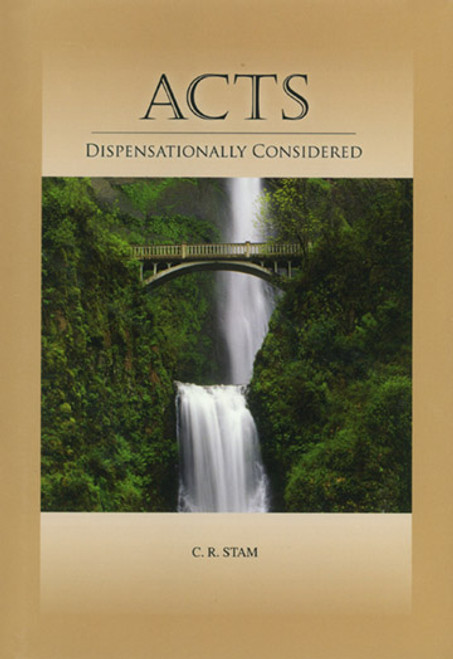I plan to do a few blog posts on some of the issues I see with what I call the "Traditional Mid Acts Position." One of the well know proponents of the Mid Acts Position is C.R. Stam. He authored an excellent commentary on "Acts Dispensationally Considered." It can be ordered from the Berean Bible Society (https://store.bereanbiblesociety.org/).

The problem for many that read Stam is a refusal to go beyond Stam in understanding Dispensational Truth. The same can be said of the readers of many other authors. As Dr. Randy White says, they will not "question the assumptions." For another couple of examples many will not go beyond the dispensational position presented in the Scofield Study Bible, and many readers of Dr. Peter Ruckman will not even consider a position on dispensationalism that does not line up with the teaching and preaching of Ruckman.
In this blog post I want to state why I disagree with most Traditional Mid Acts dispensationalists as to their position that God ended Israel's offer of the kingdom in Acts 7 with the stoning of Stephen. Most Traditional Mid Acts dispensationalists will say in Acts 7 Israel blasphemed the Holy Ghost, a sin which could not be forgiven as stated in Matthew 12:31-32, so the offer of the kingdom ceased and will not be offered again until sometime after the rapture of the Body of Christ. They will go on to point out that Paul gets saved in Acts 9 and after his salvation God uses him to reveal the mystery of the one Body of Christ.
By way of agreement, yes, I believe Israel blasphemed the Holy Ghost in Acts 7. I also believe sometime after Paul got saved God revealed the mystery of the one Body of Christ and the age of grace to him. This revelation may have been later than Acts 9 or 13, but I believe it was before Acts 28. See my blog post on "Why the name Acts 20 Grace Believer" for more information about my position on when the Body of Christ began.
It is true that Israel rejects the preaching of Stephen and actually stones Stephen, however; Stephen prays, “…lay not this sin to their charge” in Acts 7:60. The question now becomes, does Stephen get his prayer answered? The standard “Mid Acts” proponent answers the question in the negative. This is where I disagree. Stephen had the kingdom prayer promise of "ask and receive" (Matthew 7:7). Most all Mid Acts Dispensationalists say the prayer promise in Matthew 7:7 was was given to kingdom saints that would always know to pray in the will of God, because they would be filled with the Holy Ghost. Was Stephen praying according to the flesh or in the will of God in Acts 7? He had to be praying according to the will of God because Act 7:55 says he was “full of the Holy Ghost.” In light of this I believe Stephen gets his prayer answered and buys Israel more time to accept the offer of the Kingdom just as Christ did when he prayed on the cross "Father, forgive them..." (Luke 23:34). How much time does Stephen buy for Israel? It looks like they had until Acts 28:28, because at that verse Paul tells the "chief of the Jews" that the salvation of God is sent unto the Gentiles.
Please note in the above paragraph I did not say the Body of Christ
starts at the end of Acts 28, but I did say the Kingdom offer for Israel
appears to end at Acts 28. This means that during the book of Acts
there was a time when two programs were operating (the Kingdom Program
as well as the Body of Christ). Understanding this overlap of the two programs in Acts will help one
understand Paul's ministry in Acts. At times Paul seems to be doing and
preaching Kingdom doctrine. At other times he is obviously preaching
and practicing grace doctrine. Some Mid Acts Dispensationalists brush
this off by saying Paul was "confused." Paul was not confused when he
preached to Israel in Acts, because he knew that if Israel did not
remain in unbelief during the Acts Period that they could be grafted
back in rather than have the sin of blashphemy charged to them. If Paul thought the “unpardonable sin” had been charged to Israel in
Acts 7, then how could Paul say during the Acts period Israel could be “graft in again” (Rom 11:22-23) if they
started believing. Since Paul believed
God answered Stephen’s prayer in Acts 7, “lay not this sin to their charge,”
Paul prays for the national salvation of Israel in Romans 10:1. “Brethren, my
heart's desire and prayer to God for Israel is, that they might be
saved.” If Paul thought the hope of
national salvation was cast off, then why is he praying for national Israel? Prayer for the national salvation of Israel
is a kingdom prayer and desire found in the Old Testament (Psalm 14:7, Psalm
53:6, Jeremiah 3:23, and Habakkuk 3:13), and Paul is still praying that prayer in
Acts because that salvation is still a possibility until Acts 28:28.
No comments:
Post a Comment